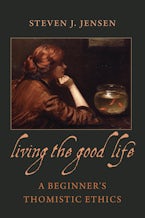- Home
- law
- religion
- philosophy
- From Human Dignity to Natural Law
Preparing your PDF for download...
There was a problem with your download, please contact the server administrator.
From Human Dignity to Natural Law
An Introduction
Foreword by Steven J. Jensen
Imprint: Catholic University of America Press
From Human Dignity to Natural Law shows how the whole of the natural law, as understood in the Aristotelian Thomistic tradition, is contained implicitly in human dignity. Human dignity means existing for one’s own good (the common good as well as one’s individual good), and not as a mere means to an alien good. But what is the true human good? This question is answered with a careful analysis of Aristotle’s definition of happiness. The natural law can then be understood as the precepts that guide us in achieving happiness.
To show that human dignity is a reality in the nature of things and not a mere human invention, it is necessary to show that human beings exist by nature for the achievement of the properly human good in which happiness is found. This implies finality in nature. Since contemporary natural science does not recognize final causality, the book explains why living things, as least, must exist for a purpose and why the scientific method, as currently understood, is not able to deal with this question. These reflections will also enable us to respond to a common criticism of natural law theory: that it attempts to derive statements of what ought to be from statements about what is.
After defining the natural law and relating it to human or positive law, Richard Berquist considers Aquinas’s formulation of the first principle of the natural law. It then discusses the love commandments to love God above all things and to love one’s neighbor as oneself as the first precepts of the natural law. Subsequent chapters are devoted to clarifying and defending natural law precepts concerned with the life issues, with sexual morality and marriage, and with fundamental natural rights. From Human Dignity to Natural Law concludes with a discussion of alternatives to the natural law.
Richard Berquist is emeritus professor of philosophy at the University of St. Thomas, Minnesota.
"There is a need for a book like this because much of what is now being published on the natural law deals with particular debates within natural law ethics and is intended primarily for academic audiences. Berquist writes for the non-specialist and provides a crystal clear and concise overview of Thomistic natural law, along with a sense of how the natural law can be applied to perennial and contemporary issues in applied ethics. He writes beautifully, with exemplary philosophical prose."
~Paul Kucharski, Manhattanville College
"How timely a book! Richard Berquist guides his reader through the implications of the dignity of the human person to discover the fullness of the natural law. Written with characteristic lucidity, this book can richly inform the thinking of any thoughtful reader."
~John F. Boyle, University of St. Thomas, Minn.
"There is no other volume which lays out natural law theory from its foundations to its many applications to ethics without being burdened with jargon, controversy or intramural debate...Anyone interested in the natural law, even those already schooled in its tenets, will not fail to benefit from this book. The clarity with which it addresses some of the most profound matters of philosophy is remarkable, and, for an introduction, its breadth is impressive. There is probably no better introduction to natural law than this."
~The New Bioethics
"Berquist modestly writes that there is little new in this book. Yet his concise review of the basic principles underlying the Catholic moral tradition, and his compelling application to a broad range of contemporary moral controversies, is enlightening for anyone wanting an introduction to the natural law. It is, in particular, a fine classroom resource for generating intelligent reflections on contemporary morality and public policy."
~American Catholic Philosophical Quarterly
"This book is an ideal text for the nonspecialist who is unfamiliar with natural law reasoning. For this reason, I am sure it will prompt in such readers many questions that go beyond the author’s stated purpose: 'to sketch or outline a way to the natural law from human dignity' (1). But I suspect that is precisely the sort of conversation with his readers that Professor Berquist sought to initiate in the writing of this book."
~The Review of Politics
"In a (post-)modern world where unbridled individual freedom is championed and social and ethical morality seems lost, Berquist’s systematic, erudite work is a breath of fresh air to remind readers that mankind is endowed with an ultimate purpose. Concise, yet comprehensive, philosophical, yet practical, the book accomplishes its goal of drawing a direct connection between human dignity and natural law."
~Journal of Interdisciplinary Studies







